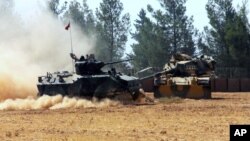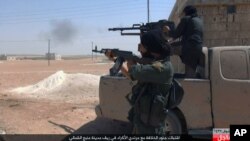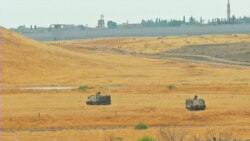The Turkish military bombed Islamic State positions Tuesday in a Syrian border town in what reports said was preparation for an assault by Turkish-backed Syrian rebels.
Some 1,500 rebels have gathered in Gaziantep, Turkey, ready to try to drive IS fighters from Jarablus, Syria. A suicide bombing rocked a wedding party Saturday in Gaziantep, leaving 54 people dead. Turkey blamed IS for the attack.
This renewed campaign by Ankara to target IS in Jarabulus is raising questions about Turkey’s next move in Syria, analysts said, and about what roles competing forces in the region targeting IS will play.
A Syrian rebel incursion from Turkey could set up a direct confrontation with U.S.-backed Kurdish forces.
“A conflict between the two sides is inevitable,” Daryous Darwish, a Syrian affairs analyst in France, told VOA in a phone interview. "This town is important to all parties involved, because any group that controls it would have access to nearly 100 kilometers along the border and 15 kilometers into the depth of Syrian territory.”
Path for supplies, troops
Jarabulus, held by IS for more than two years, has served as a major border crossing through which military supplies and foreign fighters are reportedly transported to IS territories in Syria.
The U.S.-backed and Kurdish-dominated Syrian Democratic Forces also want to liberate the city from IS. But Turkey does not want Kurds to control the town and has been training Syrian rebels in Turkey to push out IS.
“Jarabulus represents a strategic significance for the SDF,” said Syrian activist Mustafa Abdi. Taking control of "Jarabulus from [IS] means militants would have no access to the borders anymore, and it would allow the SDF to focus on fighting them elsewhere.”
But Kurdish groups have voiced concerns about Turkey’s real intentions as it increases military activities near Jarabulus.
The U.S.-backed SDF said that any Turkish incursion into Syria would have unintended consequences in the fight against IS.
“Turkey intends to make obstacles for the war that local groups are waging against [IS] terror,” the SDF said in a statement Monday.
The SDF accused the Turkish government of backing Islamist rebels in a bid to stop Kurdish advances in northern Syria.
Equally dangerous
Ankara has often said that IS and Kurdish groups are equally dangerous to Turkish national security. The Turkish government fears that any Kurdish gain in Syria would empower the Turkey-based Kurdistan Workers’ Party (PKK) militants who have been battling Turkish forces inside Turkey.
Turkey opposed Kurdish gains in the nearby town of Manbij that was liberated by the SDF this month with U.S. help. And as the weekend bombing in Gaziantep showed, IS is a direct threat to Turkey, Turkish officials say.
WATCH: Turkey Steps Up Work on Border Wall Against Islamic State
In a move to tighten its borders with Syria, Turkey has stepped up the construction of a 208-kilometer wall on the border between the two countries.
Turkish Foreign Minister Mevlut Cavusoglu said Turkey is determined to “root out IS from the border area.” Fighting IS is Turkey’s “most natural right,” he said.
But critics of Turkish President Recep Tayyip Erdogan say it is too late for Ankara to act against the militants.
“IS has built nests in at least three regions of Gaziantep,” said Elif Dogan Turkmen, a member of the Turkish Parliament from the Republican People’s Party (CHP). “Currently there is no control on the borders. Anyone can cross the border [from Syria] easily.”
VOA’s Kasim Cindemir contributed to this report from Washington.







